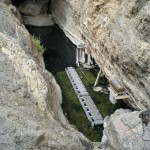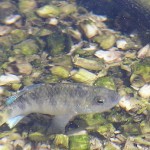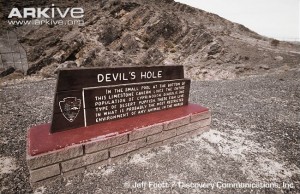If you can intervene to stop an extinction, should you?
That’s a question that science journalist Hillary Rosner raises in the most recent issue of Wired. She places in evidence for our consideration the Devil’s Hole pupfish, Cyprinodon diabolis, an unlucky little piscine which holds a slew of sad distinctions: it was one of the first species declared endangered by the U.S. government, it’s one of the most endangered we know of, and its population is more confined, has a smaller range, than any other vertebrate on earth.
 The entire universe of this variety of pupfish is contained in this deep desert aquifer. Their numbers have been plummeting since science first noticed them. At present there’s believed to be less than 100.
The entire universe of this variety of pupfish is contained in this deep desert aquifer. Their numbers have been plummeting since science first noticed them. At present there’s believed to be less than 100.
Rosner details some of the grim consequences of the fish’s plight, caused by both their low numbers and their isolation. Food is scarce in Devil’s Hole, and all of the pupfish population shows signs of emaciation. There’s also evidence of genetic strife, with some unfortunate mutations getting bred in at higher and higher numbers as the overall population drops.
It sounds like a downward spiral toward extinction, and it probably is. The spiral was touched off, quite unintentionally, by human intervention. Decades ago, Devil’s Hole was part of a much larger contiguous aquifer system, all of it teeming with life and jumping with pupfish. Nearby agriculture dropped the water table, leading to isolated aquifers like Devil’s Hole, and to the now-locked-in populations of pupfish starting to diverge genetically.
And here’s where we need to digress into semantics, because to understand what can and can’t be done for the pupfish, we have to understand what we mean when we say ‘species.’ Is the Devil’s Hole pupfish a distinct species? There are taxonomic differences, clearly visible ones and scientifically measurable ones, that make C. diabolis unique. Most biologists familiar with them would consider them at least a sub-species. That again might be semantical, but it seems close to definitive.
Or is it? One old, now mostly discarded definition of ‘species’ included an axiom that a species can only successfully breed within its own population. Yet we know that the Devil’s Hole Pupfish can breed with other ‘species’ of pupfish, from the surrounding desert region. Even with varieties so diverged as to have differing numbers of fins, the pupfish not only interbreed, but the hybrid populations actually thrive. Much more so, at least in controlled environments, than the “wild” pupfish.
The semantics of this become important in light of the idea, floated by a few of the biologists Rosner spoke with, that pupfish extinction might be averted. And averting it might be as easy as dropping into Devil’s Hole a few fertile females from nearby ponds.
That hasn’t happened yet, and it probably won’t happen anytime soon. Population management isn’t something we’re particularly good at, although we’re just now realizing it after thousands of years of trying. Science recalls with a shudder all the species we’ve wiped out under the rubric of ‘management.’ No way they’ll allow hybridization of the pupfish in the name of saving it, especially knowing that’ll mean the end of C. diabolis as a distinct species, or even sub-species.
I understand their point, but I wonder if they’re not missing the forest fire for the trees. We can save this species. By ending an isolation we caused.
In rebelling against the antiquated, destructive past methods of species management, the establishment of contemporary science opts for another way that seems, to me, just as antiquated. They opt to freeze nature in place, like it’s behind glass in a museum, like it exists in a world unmeddled with by man.
Sorry, but that ship has already sailed. The pupfish, like so many species, like our planet itself, has already been meddled with plenty. The meddling bell cannot be unrung.
So maybe the only solution is to re-ring it. To meddle further. To save a species by changing it forever.
It’s not something I’d advocate if I saw any other choice than inaction. And if I knew, as I do in this case, that inaction will almost surely lead to extinction.
It’s only a pupfish. Doesn’t even look all that tasty. But not only can we save it, but in saving it we might be trying out a new mindset, one that might allow us to save ourselves.
